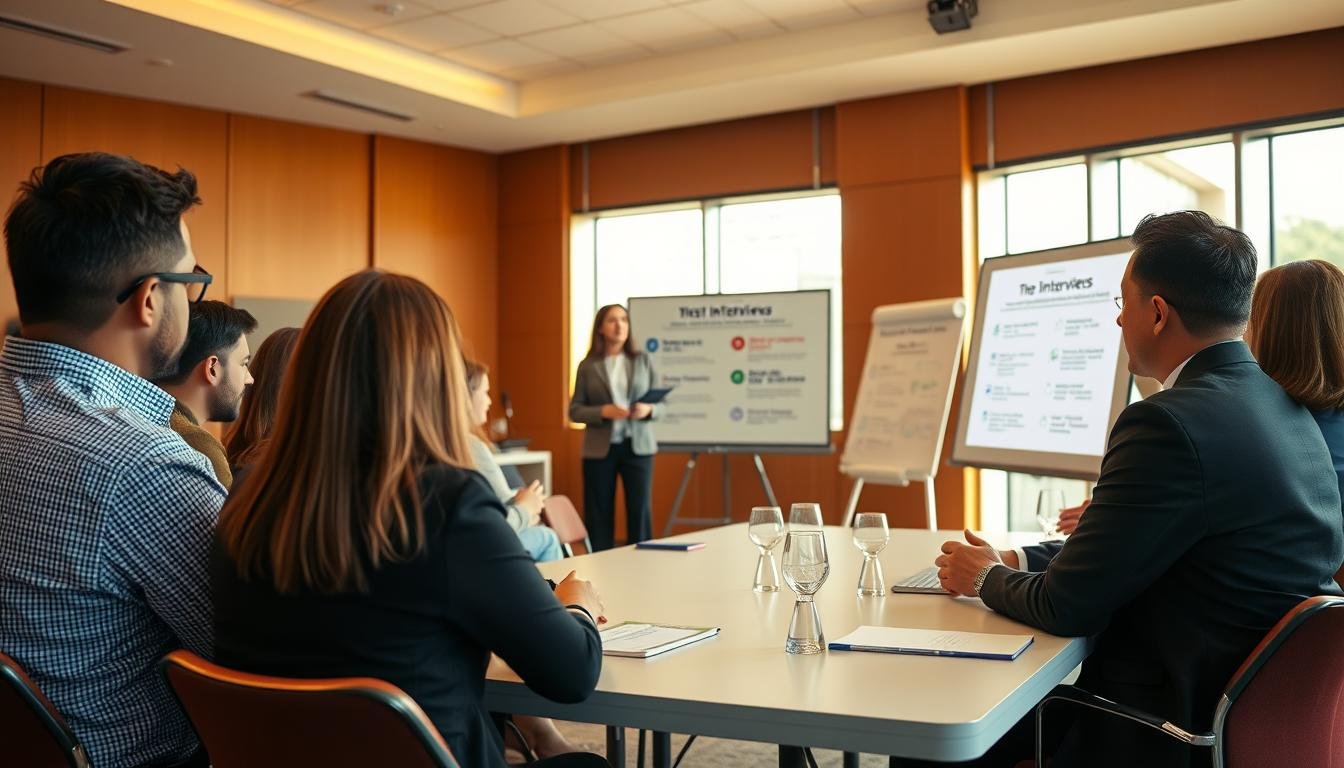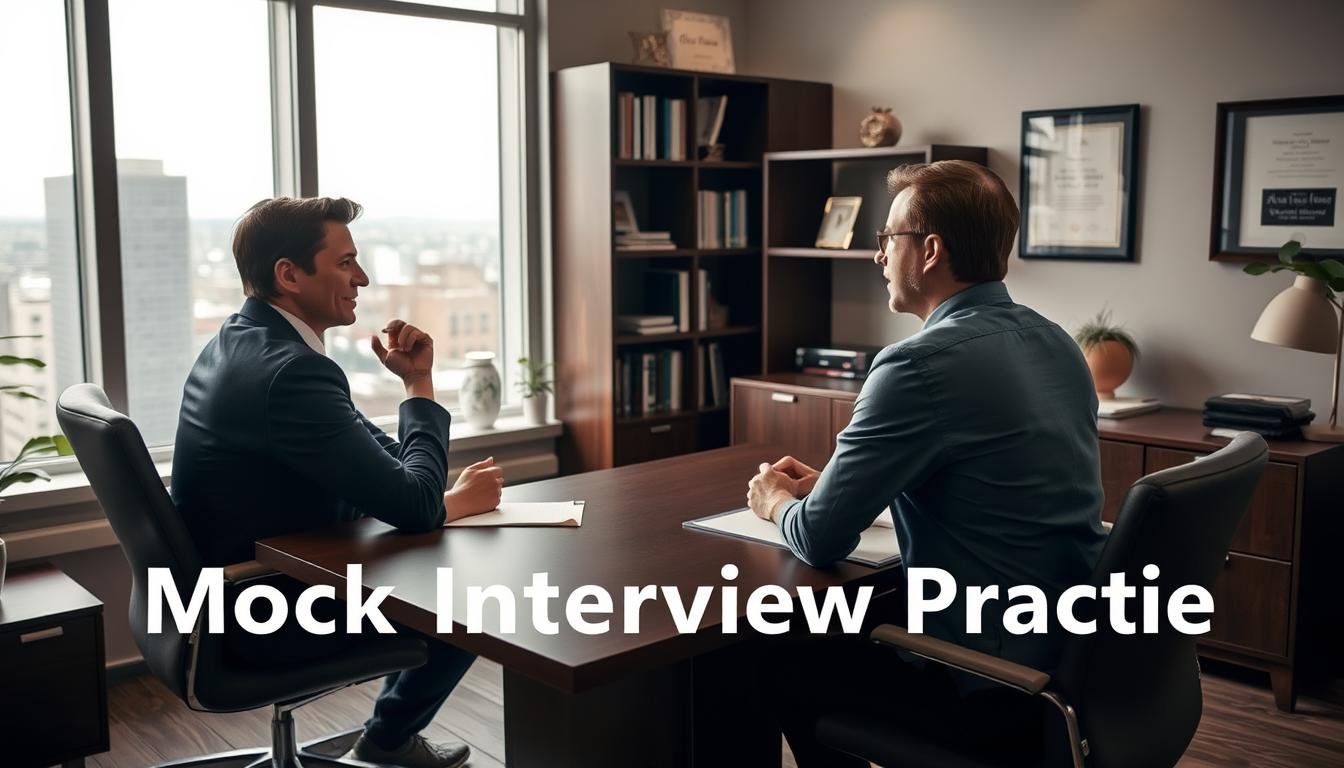Now Reading: How to Run an Effective Job Interview Practice Workshop
-
01
How to Run an Effective Job Interview Practice Workshop
How to Run an Effective Job Interview Practice Workshop

How to Run an Effective Job Interview Practice Workshop
A mock interview workshop can change the game for job seekers. It gives them the confidence and skills to nail real interviews.
Did you know a well-structured mock interview can boost a candidate’s hiring chances by up to 25%? This shows how crucial it is to prepare for the real thing.

Workshop practicing job interviews mimics real-life scenarios. It helps participants spot areas for growth and craft solid answers to common questions.
Key Takeaways
- Understand the benefits of a mock interview workshop for job seekers and organizations.
- Learn how to structure a mock interview for maximum effectiveness.
- Discover the importance of creating a supportive environment for participants.
- Gain insights into providing constructive feedback to improve interview skills.
- Explore the role of workshop practicing job interviews in enhancing candidate confidence.
Understanding the Purpose and Benefits of Interview Practice Workshops
In today’s job market, interview practice workshops are key for job seekers and career changers. They help participants gain the skills and confidence needed for job interviews.
Key Learning Objectives for Participants
Workshop participants learn essential interview skills. They learn how to prepare for common questions, improve body language, and share their experiences. The focus is on personalized feedback and practical exercises for better preparation.
Benefits for Job Seekers and Career Changers
These workshops are a safe space for job seekers and career changers. They get to practice their skills, receive feedback, and learn from others. This reduces interview anxiety and boosts performance.
Value for Organizations and Career Centers
Organizations and career centers gain by offering these workshops. They improve their support services and the employability of their candidates. These workshops show their commitment to career development.
Planning Your Workshop Practicing Job Interviews
Setting up a job interview practice workshop needs a lot of thought. It’s important to plan well to make sure everyone has a good time and learns a lot.
Determining Workshop Duration and Format
The length and style of the workshop are key to its success. Workshops can last from a few hours to a whole day. This depends on how deep you want to dive into the topics and how many people are coming.
- Half-day workshops are great for focusing on certain interview skills.
- Full-day workshops cover more, including practical interview techniques and role-play interview exercises.
Selecting Appropriate Venue and Setup
The place and setup are crucial for a good learning environment. The room should be comfy, bright, and have all the needed stuff.
Creating a Detailed Workshop Agenda
A clear agenda is vital for a great workshop. It should mix theory and hands-on practice.
Sample Timeline for Half-Day and Full-Day Workshops
Here’s a sample plan to help you organize your workshop:
| Time | Half-Day Workshop | Full-Day Workshop |
|---|---|---|
| 9:00 AM – 9:30 AM | Introduction and Icebreaker | Introduction and Icebreaker |
| 9:30 AM – 10:30 AM | Practical Interview Techniques | Practical Interview Techniques |
| 10:30 AM – 12:00 PM | Role-Play Exercises | Role-Play Exercises and Feedback |
By planning the workshop’s length, style, venue, and agenda carefully, you can make a valuable learning experience. This will help participants get the interview skills they need.
Recruiting and Preparing Workshop Participants
A successful simulated interview experience starts with picking the right people and getting them ready. To make a job interview practice session work, organizers need to think about a few important things.
Marketing Your Workshop to Target Audiences
Getting the word out is key to finding the right people. Use social media, professional networks, and career services to reach your audience. Tailoring the marketing message to show the workshop’s benefits, like better interview skills and more confidence, can draw in participants.
Pre-Workshop Participant Questionnaires
To get participants ready, ask them questions before the workshop. This helps you tailor the workshop to fit their needs. It makes the job interview practice session better for everyone.
Setting Clear Expectations for Attendees
It’s important to be clear about what to expect. Give all the details about the workshop format, what will happen during it, and what participants need to do beforehand. Being clear helps reduce anxiety and keeps everyone focused.
Pre-Workshop Materials and Assignments
Give out materials and assignments before the workshop to improve the learning experience. This could include reading on common interview questions, tips on body language, or assignments to think about personal strengths and weaknesses. These preparations help participants get the most out of the simulated interview experience.
- Utilize multiple marketing channels to reach target audiences.
- Use pre-workshop questionnaires to tailor the workshop content.
- Set clear expectations through detailed communication.
- Provide pre-workshop materials to enhance the learning experience.
Assembling Your Team of Interview Facilitators
To run a great job interview practice workshop, you need a skilled team of facilitators. They guide participants, offer feedback, and help improve interview skills training.
Recruiting Industry Professionals and HR Experts
Start by finding industry pros and HR experts with interview experience. They know the latest trends and what employers want. Their knowledge makes your workshop more realistic and helpful for participants.
Training Facilitators on Workshop Methodology
After picking your team, train them on your workshop’s way and goals. Teach them about mastering interview communication. This includes giving feedback and setting up mock interviews. This ensures everyone works towards the same goals.

Creating Facilitator Guidelines and Resources
Give your facilitators all they need to do their job well. This includes feedback forms, mock interview scripts, and common interview questions. With the right tools, your workshop will be more effective, and participants will learn a lot.
Developing Realistic Interview Scenarios
To make mock interviews effective, it’s key to create scenarios that match real job interviews. This means understanding today’s industry trends and the needs of the roles being applied for.
Researching Current Industry Interview Trends
Research is the base for creating real interview scenarios. Organizers need to keep up with the latest trends and interview practices. They should also know the skills needed for various roles. This can be done by talking to industry experts, looking at job descriptions, and using feedback from past participants.
Creating Role-Specific Interview Questions
It’s important to make interview questions that fit the job. These questions should check if a candidate has the right skills and knowledge. For example, tech jobs might need problem-solving tests, while management roles could ask about leadership and decision-making.
Designing Challenging Behavioral Scenarios
Behavioral questions look at a candidate’s past to guess their future performance. Organizers should make scenarios that are tough but still fit the job. This could include dealing with tough customers or making big decisions quickly.
Industry-Specific Interview Question Banks
Having question banks for each industry helps tailor workshops. These banks should be updated often to keep up with industry changes. This way, participants are ready for the questions they’ll face in real interviews.
By following these steps, organizers can offer a comprehensive and realistic interview practice experience. This will help participants gain the skills and confidence they need for real job interviews.
Creating a Supportive Learning Environment
To make a supportive learning space for job interview coaching or simulated interviews, we need to think about a few things. The main goal is to make a place where everyone feels at ease and supported while learning.
Establishing Ground Rules for Constructive Feedback
It’s important to set clear rules for giving feedback. This means making sure everyone knows how to interact with each other and the facilitators.
Managing Participant Anxiety and Nervousness
It’s key to handle anxiety and nervousness well. People might worry about sharing their stories or asking questions.
Fostering Collaboration Among Participants
Encouraging teamwork is crucial for a good learning space. By getting people to work together, share their stories, and learn from each other, we build a sense of community and cooperation.

Structuring Effective Mock Interview Sessions
To get the most out of a mock interview, it’s important to plan well. This means setting up the structure of the mock interviews. It involves several key elements that help create a great learning experience.
Setting Up Interview Stations and Rotations
Setting up interview stations is key to a successful mock interview workshop. These stations should look like real interview settings. Organizers should use different rooms for different types of interviews, like one-on-one or panel interviews. A rotation system helps participants move between stations smoothly.
Time Management for Practice Interviews
Time management is crucial for a productive job interview practice session. Each mock interview should last 15-20 minutes. Then, there’s time for feedback. Make sure the workshop lasts long enough for participants to try out several mock interviews.
Recording Options for Self-Assessment
Recording mock interviews can help participants learn from their mistakes. It lets them see how they did and what they can improve. It’s important to ask participants’ permission before recording.
Sample Interview Station Layouts
Here are some examples of interview station layouts:
- One-on-one interview setup
- Panel interview configuration
- Group discussion arrangement
These layouts can be adjusted based on the workshop’s needs and goals.
Teaching Essential Interview Techniques
Effective interview skills are key to making a good impression on employers. We will explore important interview techniques to boost your job interview performance.
Non-Verbal Communication Skills Training
Non-verbal cues are crucial in how interviewers see you. Learning non-verbal communication can help a lot. This includes eye contact, body language, and voice tone.
Answering Difficult Questions Effectively
Being ready for tough questions is essential. Think about common interview questions and practice your answers. This shows your skills and experiences clearly and confidently.
Strategies for Showcasing Relevant Experience
It’s important to highlight your relevant experience. Talk about your achievements and qualifications. Be ready to give examples that show your expertise.
Common Interview Mistakes and How to Avoid Them
Avoiding common interview mistakes can greatly improve your chances. Watch out for mistakes like poor preparation, bad body language, and weak answers. Knowing these can help you do better and succeed.
Delivering Constructive Feedback to Participants
Giving constructive feedback is key in job interview coaching or practice workshops. It helps participants improve their skills and get ready for real interviews. We’ll look at why giving feedback is important and how to do it well.
Creating Standardized Feedback Forms
Creating standardized feedback forms is crucial. These forms help assess participants’ performance and show their strengths and areas for growth. A standardized format ensures feedback is consistent and reliable.
Balancing Positive Reinforcement with Areas for Improvement
It’s important to balance positive feedback with areas for improvement. Positive feedback boosts participants by highlighting their strengths. Areas for improvement guide them to grow their skills. This balance keeps the feedback supportive and constructive.
Facilitating Peer Feedback Sessions
Peer feedback sessions are great for constructive feedback. They let participants get feedback from their peers, creating a collaborative learning space. This approach helps identify areas for improvement and builds a sense of community.
The STAR Method for Structured Feedback
The STAR method is a popular way to give structured feedback. It stands for Situation, Task, Action, and Result. This method makes feedback comprehensive and well-organized, helping assess performance and understand strengths and weaknesses.
- Situation: Describe the context and situation of the feedback.
- Task: Clearly outline the task or assignment for the feedback.
- Action: Specify the actions taken by participants and the feedback given.
- Result: Discuss the outcome or results of the participants’ performance and the feedback’s impact.
Using the STAR method ensures feedback is informative and engaging. This structured approach makes feedback relevant, specific, and actionable, improving its effectiveness.
| STAR Method Components | Description |
|---|---|
| Situation | Context and situation description |
| Task | Task or assignment details |
| Action | Actions taken by participants |
| Result | Outcome or results of participants’ performance |
Measuring Workshop Success and Gathering Feedback
To keep improving, it’s key to measure how well a simulated interview experience workshop does. This means getting feedback and checking how participants are doing.
Designing Effective Evaluation Forms
It’s important to make good evaluation forms to get feedback from participants. These forms should ask about the workshop’s content, the facilitators, and the learning experience. Using both multiple-choice and open-ended questions helps get different kinds of data.
Tracking Participant Outcomes
It’s important to track how participants do after the workshop. This can be done by asking them questions later, after they’ve used what they learned in real interviews. This way, we can see if they’re doing better in interviews and if they’ve found jobs.
Implementing Improvements for Future Workshops
The feedback and data should help make future workshop practicing job interviews better. This could mean changing the curriculum, the mock interview format, or adding more resources. By always trying to get better, the workshops can stay useful and meet the needs of job seekers.
Conclusion
Improving your interview skills is key to getting your dream job. Career centers and organizations can help with mock interview workshops. These sessions offer valuable training.
This guide has shown how to set up a great job interview practice workshop. It covers everything from planning to giving feedback. Each step is important for success.
By following these steps, you can create a space where everyone learns and grows together. This means job seekers can handle tough questions better. They can also show off their skills to employers.
In the end, a well-run mock interview workshop can really help in your job search. It makes job seekers more confident and ready for interviews.
FAQ
What is the primary goal of a job interview practice workshop?
The main goal is to help people get better at job interviews. They learn through mock interviews, get feedback, and learn key techniques.
How can organizations benefit from hosting a job interview practice workshop?
Companies gain by improving their candidates’ interview skills. It also boosts their reputation and can save time and money in hiring.
What are the key elements to consider when planning a job interview practice workshop?
Important things include setting the workshop’s length and style, picking a good place, and making a detailed plan. You also need to find the right people to lead it and create real interview scenarios.
How can facilitators be prepared to deliver effective feedback during the workshop?
Facilitators need training and to use standard feedback forms. They should mix positive comments with constructive criticism. They also help with peer feedback using methods like the STAR method.
What techniques are typically covered in a job interview practice workshop to help participants improve their interview performance?
The workshop covers how to use body language, answer tough questions, and share relevant experiences. It also teaches how to avoid common mistakes.
How can the success of a job interview practice workshop be measured?
Success is measured by using good evaluation forms, tracking results, and getting feedback. This helps improve future workshops.
What is the role of mock interviews in a job interview practice workshop?
Mock interviews are key. They give participants a chance to practice, get feedback, and improve in a safe space.
How can a supportive learning environment be created during the workshop?
A supportive space is made by setting rules for feedback, managing nerves, and encouraging teamwork. Facilitators should be trained to offer positive and helpful guidance.






























